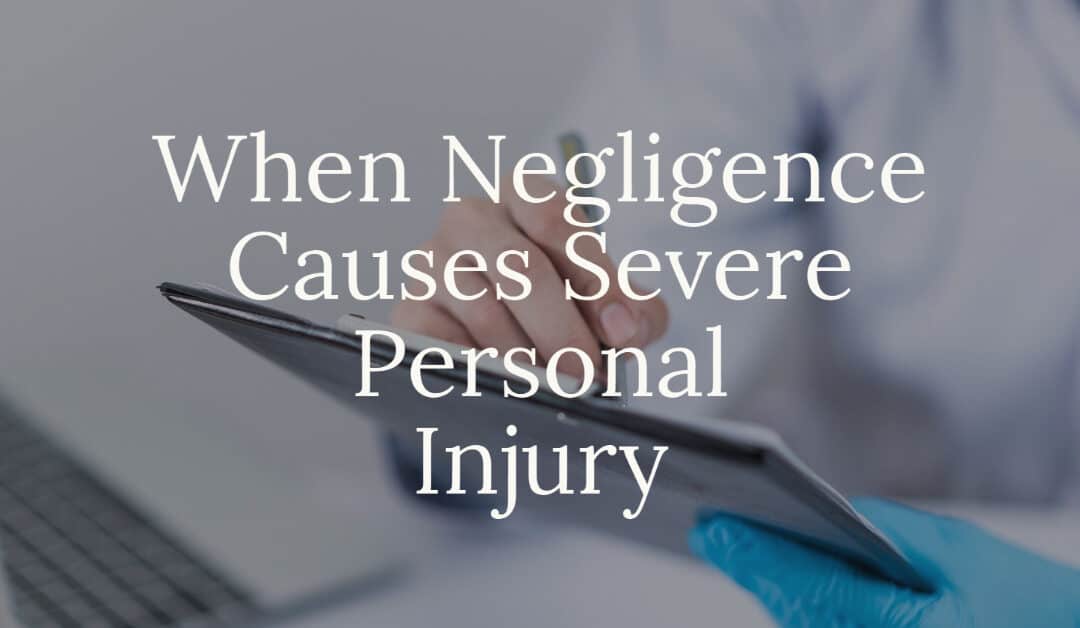Whether in a car accident or work accident, a severe personal injury is no joke. Traumatic injury caused by motor vehicle collisions, sports injuries, falls, natural disasters, etc., requires immediate care at a hospital. Severe personal injuries take time and resources to come back from.
Use Our Personal Injury Calculator to See If You Might Be Entitled to a Settlement.
Let’s look at what severe injuries include, what kinds of negligence causes them, and how to pay your medical bills and receive compensatory damages.
Traumatic Injuries
According to the University of Florida Health, “Traumatic injury is a term which refers to physical injuries of sudden onset and severity which require immediate medical attention. The insult may cause systemic shock called “shock trauma,” and may require immediate resuscitation and interventions to save life and limb.”
UofFHealth lists some common types of traumatic injuries, including:
- Traumatic brain injury
- Spinal cord injury
- Spine fractures
- Amputation – traumatic
- Facial trauma
- Acoustic trauma
- Crush injury
- Concussion
- Broken bone
- Jaw – Broken or dislocated
- Skull fracture
- Cuts and puncture wounds
- Collapsed lung
- Myocardial contusion
- Burns
- Electrical injury
- Hypovolemic shock
- Subarachnoid hemorrhage
- Subdural hematoma
Injury Severity Score (ISS)
Medical teams use The Injury Severity Score to assess multiple injuries correlating with mortality, morbidity, and other measures of severity.
The ISS score bases calculations on the Abbreviated Injury Scale (AIS). The ISS is calculated as the sum of the squares of the highest AIS code in each of the three most severely injured ISS body regions.
These body regions are:
- Head or neck injuries include brain or cervical spine injury, skull or cervical spine fractures, and asphyxia/suffocation.
- Facial injuries include those involving mouth, ears, nose, and facial bones.
- Chest injuries include all lesions to internal organs, drowning, and inhalation injury. Chest injuries also include those to the diaphragm, rib cage, and thoracic spine.
- Abdominal or pelvic contents injuries include all lesions to internal organs. Included in the abdominal or pelvic region are lumbar spine lesions.
- Extremities or pelvic girdle injuries include sprains, fractures, dislocations, and amputations.
- External and other trauma injuries include lacerations, contusions, abrasions, and burns, independent of their location on the body surface, except amputation burns assigned to the appropriate body region. Other traumatic events assigned to this body region include:
- electrical injury
- frostbite
- hypothermia
- whole body (explosion-type) injury (1)
Scoring Using ISS Scale
Each injury in every body region scores according to its relative severity on a six point scale:
- Minor = 1 point
- Moderate = 2 points
- Serious = 3 points
- Severe = 4 points
- Critical = 5 points
- Maximal (currently untreatable) = 6 points
Injury Severity Scores range from 1 to 75. If an injury is assigned an AIS of 6 (identifying a currently untreatable injury), the ISS score is automatically assigned 75. (1)
What is Negligence?
According to Cornell Law School Legal Information Institute, negligence is “a failure to behave with the level of care that someone of ordinary prudence would have exercised under the same circumstances. The behavior usually consists of actions, but can also consist of omissions when there is some duty to act (e.g., a duty to help victims of one’s previous conduct).”
Negligence happens when someone goes more than 15 mph over the speed limit and texting carelessly swerves into your lane, hitting you in a head-on collision. When someone acts recklessly and causes you injury, that is negligence on their part.
A person behaves negligently if they rear-end your car in an accident and then leave you unconscious without calling the police or emergency personnel to help you. An average person would call for help if they cause someone else to become unconscious. In certain situations, others have a duty to help you. By rear-ending your vehicle without calling emergency personnel to help you, the other driver acts negligently.
Severe Personal Injury Caused By Negligence
There are legal remedies available to those injured in an accident caused by negligence. For example, let’s say someone causes you severe personal injury through their carelessness. In that case, you can file a lawsuit to recoup your medical expenses, pain and suffering, lost wages, and other expenses associated with your injury.
Filing a lawsuit can help you pay medical bills and make up for lost time at work. However, the pain and suffering you go through in an accident with a severe personal injury can never reach an amount that makes everything okay.
For your pain and suffering, courts award damages to you based on the severity of your injuries. The money awarded by a court for your damages is called compensatory damage compensation.
Sometimes when a person faces severe personal injury, they do not seek damages from the liable party. It is crucial to realize that someone carelessly causing an accident owes you a debt.
Recovery Predictors
A study done by BMC Health found that “the strongest predictor of mood status [after an accident] was:
- Pain-related catastrophising: ruminating and over-thinking how you feel and what may happen in the future
- Dissatisfaction with the insurance company attributed to
- Lack of communication and lack of information
- Delayed or denied payments of compensation
- Slow treatment approval and discussions about causality
- Too much complicated paperwork
- Discussions about who was at-fault (3)
Seeing a counselor to talk through your worries and help with overthinking your injuries could help you recover sooner. To feel more content about the process, letting your attorney handle the details with the insurance company could also help your overall mood.
We Can Help
At Jarrett Law, we work with victims of negligence who are suffering from severe personal injuries. We help you overcome barriers to recovery, both physical and financial. We understand the laws that protect you as an individual. You have the right to pursue health and happiness. When someone else takes your rights away through negligence, they owe you compensation. Our experienced team of legal professionals works with you to find your way back to a full life. Contact us today and find out how we can help you.

